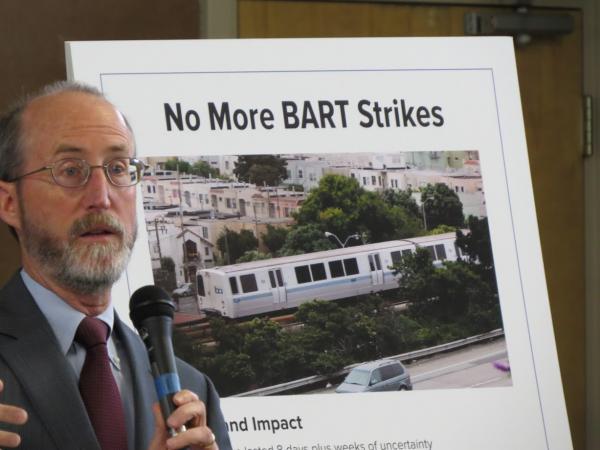BART says the bond is necessary for critical infrastructure needs, including extensive electrical, track and structural upgrades throughout the system. The bond would also pay for a new central computer control system that would allow trains to run closer together and relieve crowding on a system that saw a 22.5 percent daily ridership increase between June 2011 and June 2016.
The bond, Measure RR, will be on the ballot in San Francisco, Contra Costa and Alameda counties. To pass, the proposal needs a two-thirds yes vote -- 66.66 percent of the total vote in the three-county district.
Radulovich, the BART president, said Glazer's opposition will only serve to undermine a system the state senator professes to support.
"He is not getting back at the board or the workers by not supporting the bond," Radulovich said. "He's merely making sure BART can't meet its obligations in terms of the service the Bay Area needs. So it's petty."
Radulovich also flatly rejected a criticism voiced by Glazer and others -- notably East Bay Times columnist Daniel Borenstein -- that the bond will make it possible for BART to shift other funds in its budget from long-term projects to worker salaries and benefits.
The funds at issue involve operating revenue from fares and other sources that BART sets aside to help pay for upcoming capital expenses, such as acquiring new train cars and expanding its Hayward maintenance facility. BART officials have said the agency will spend $1.8 billion from operating revenue over the next decade for its capital needs.
But Glazer and Borenstein note that BART's commitment on $1.2 billion of that operating revenue is not binding and that the money could be spent on worker salaries and benefits, which they complain are already too high. Glazer says the agency should have agreed to place a portion of its future operating revenue in "a lockbox" to ensure it's spent as BART is promising now -- a notion Radulovich dismissed.
"We can't put it in a lockbox the way he would like us to or imagines he can," Radulovich said. "He should know this -- the state can't do this either."
Radulovich also said BART has a strong history of using its operating revenue to support the system's long-term needs.
"As far as funds going from capital to operating, actually the story, as long as I've been on the BART board, nearly 20 years, has been the other way around," Radulovich said. "We take operating money and put it in capital. We're doing $140 million this year. We have sustained that transfer from operating to capital for every year I've been on the board, through the worst recession in BART history."
Glazer said BART riders fed up with chronic rush-hour overcrowding and train breakdowns should elect a new BART board to restore public confidence in the system. Only then should they consider revenue measures, he said.
"First, they should participate in the election and throw their BART directors out," Glazer said. "Most of them have been around, with one exception, and have been part of the problem that has built up over these many years. So they [riders] should engage, and their voting opportunity is the place to engage."
Radulovich said the choice for voters in the BART counties is whether they're willing to invest in the system at a time that state and federal support for transit is shrinking.
"We've done the best we can to make do with the resources that are there, but they're simply not adequate," Radulovich said. "The people of the Bay Area put a lot of their own money in to build the BART system 50 years ago, and it's served us incredibly well. And we're asking the Bay Area to do that again."
